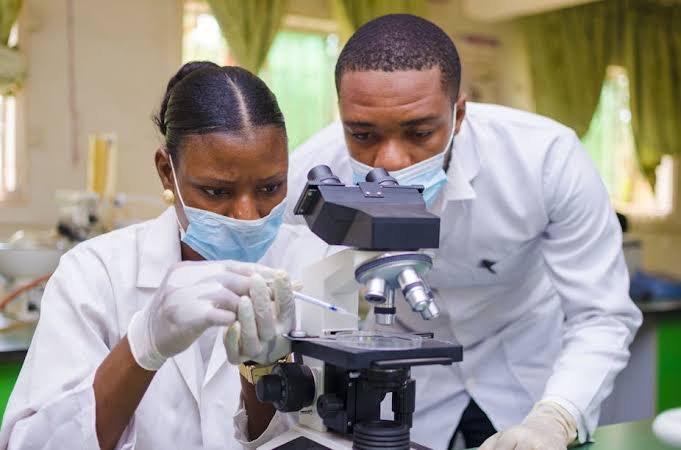In a defining move to energise innovation and entrepreneurship among Nigerian undergraduates, the Federal Government has unveiled plans to roll out the STEMM Up Grant initiative — a visionary programme designed to ignite student‑led enterprises across universities nationwide. Known formally as the Sciences, Technology, Engineering, Mathematics and Medical Sciences Student Venture Capital Grant (S‑VCG), this scheme marks a bold step toward transforming Nigeria’s youthful creativity into scalable, job‑creating ventures.
The announcement was formally made in Abuja on July 25, 2025, when Minister of Education Dr. Tunji Alausa disclosed details ahead of the official launch, scheduled for August 28, 2025.
Table of Contents

A Strategic Launchpad for Student Innovators
At a major stakeholder engagement involving vice‑chancellors, rectors, student representatives, academic staff, and development partners, Dr. Alausa underscored the programme’s ambition:
“S‑VCG is not just a grant. It’s a launchpad for bold, young innovators to lead Nigeria’s industrial and technological advancement.”
The minister emphasised that the initiative provides more than capital—it grants access to mentorship, incubation services, business development and enterprise support frameworks so that original ideas from Nigeria’s tertiary institutions can become market-ready ventures.
Who Is Eligible and What They Stand to Gain
- Target Audience: Full‑time undergraduate students in STEMM (Science, Technology, Engineering, Mathematics and Medical Sciences), particularly those in 300-level and above.
- Funding Support: Selected projects can receive up to ₦50 million in startup capita.
- Value Beyond Capital: Beneficiaries also get incubation space, structured mentorship, and capacity‑building services designed to scale their business ideas sustainably.
Anchored in Nigeria’s Economic Vision
This initiative aligns squarely with President Bola Tinubu’s Renewed Hope Agenda, which has placed youth empowerment, inclusive education, and economic diversification at its forefront.
Dr. Tunji Alausa added:
“We are giving our students the tools to dream, build, and scale solutions that solve real‑world challenges—from tech and medicine to agriculture and green energy.”
This narrative reflects the federal government’s commitment to shift from a resource‑based to a knowledge‑based economy, where research, innovation and entrepreneurship take centre stage.
The Role of Key Institutions and Oversight Structure
To ensure transparency, accountability and impact delivery, the Bank of Industry (BoI) has been engaged as the financial partner. This collaboration will guide disbursement processes, monitor implementation and provide necessary business development oversight.
Meanwhile, the Tertiary Education Trust Fund (TETFund) will act as the secretariat, coordinating programme logistics and institutional support networks.
Also inaugurated was the Research and Innovation Commercialisation Committee (RICC)—a 25‑member task force chaired by Dr. Tayo Aduloju, the CEO of the Nigerian Economic Summit Group (NESG). Members include representatives from academia, the Bank of Industry, the Manufacturers Association of Nigeria (MAN), and the Federal Ministry of Innovation, Science & Technology.
The RICC’s responsibilities include:
- Defining eligibility criteria for the grant.
- Bridging the gap between research laboratories and commercial markets.
- Setting incubation and funding frameworks.
- Advocating for intellectual property policies and industry‑academic partnerships.
- Monitoring outcomes and driving sustained implementation.
Why the STEMM Up Grant Matters
1. Closing the Research‑to‑Market Divide
Despite universities’ rich history of academic research and innovation, Nigeria has often struggled to commercialise output. The new programme addresses this longstanding gap by offering a formal pathway from lab to market.
2. Tackling Youth Unemployment and Unlocking Economic Value
Nigeria’s youthful population faces high graduate unemployment. By turning student innovations into job‑creating enterprises, the initiative aims to reduce unemployment and generate economic opportunities.
3. Building Nigeria’s Profile as a Hub for Innovation
With complete ecosystem support—funding, mentorship, incubation—Nigeria aspires to position itself as a continental hub for student‑driven technology and enterprise, with the STEMM Up Grant as a cornerstone.
Voices of Support: From Stakeholders and Students
Professor Suwaiba Sa’id Ahmad, Minister of State for Education, spoke passionately about the initiative:
“This grant is a strategic investment in Nigeria’s knowledge economy … it is the product of months of consultations with students, academic staff, and institutional leaders to ensure it meets real needs.”
Meanwhile, RICC Chair Dr. Tayo Aduloju reaffirmed the urgency of elevating innovation capital in driving national transformation:
“If Nigeria’s ‘Nigeria First’ policy is to truly succeed, investment in innovation must lead the charge.”
At the event, many student leaders and university administrators expressed excitement and optimism. They welcomed the STEMM Up Grant as a game-changer—one that equips young innovators with the support they need to solve real local challenges, from agritech to health tech and renewable energy.
Timelines and Implementation Plan
The official unfolding of the initiative unfolds as follows:
- July 25, 2025: Public announcement and stakeholder briefing in Abuja.
- August 28, 2025: Formal launch of the STEMM Up Grant.
- September–October 2025: Rollout of grant rounds, eligibility screening, and disbursement windows supervised by RICC and BoI.
The Ministry of Education has pledged an inclusive, nationwide implementation, backed by robust monitoring and evaluation frameworks to ensure transparency and sustainability across Nigeria’s diverse tertiary institutions.

What This Means for Nigerian Students and the Economy
- Increased Access to Growth Capital: Students with viable innovations can now access significant up‑front funding—something previously inaccessible in Nigeria’s early-stage venture landscape.
- Holistic Enterprise Support: Beyond money, students benefit from structured mentorship, incubation hubs, business planning, and market linkage services.
- National Recognition of Youth Talent: The initiative signals that the Nigerian government sees its youth as future leaders—investing in their success rather than waiting for others to do so.
- Boost to Research Commercialisation: With TETFund and BoI involved, universities may be incentivised to prioritise market-oriented research and industry partnerships.
Potential Challenges and How They’re Being Addressed
Ensuring Fair Access: To avoid regional or institutional bias, RICC has been set up with representatives from diverse sectors and locations. Eligibility criteria are expected to be transparent and merit-based.
Fund Allocation and Use: The BoI’s involvement ensures that funds are allocated strictly to viable business ventures, with oversight to prevent misuse.
Capacity Constraints: Many students may lack practical entrepreneurial experience. That’s why mentorship and incubation have been built into the programme, so ideas are supported through the execution phases.
Sustained Impact Post-Grants: The Ministry has emphasised follow-up mechanisms, including monitoring grant progression and ensuring grantees remain active in business development.
How Interested Students Can Engage
While full application guidelines are still being finalised, students in STEMM fields, particularly in 300 level or above, should prepare to:
- Develop innovative, scalable business ideas or early‑stage ventures relevant to pressing Nigerian challenges in technology, medicine, agriculture, green energy, fintech, health, and more.
- Assemble a business plan and pitch materials.
- Engage with their university’s research offices or innovation hubs to align with eligibility pathways.
- Attend upcoming ministry announcements or regional sensitisation sessions as details on application windows and submission portals are disclosed (likely in August 2025).
Looking Ahead: The Bigger Picture
The STEMM Up Grant initiative reflects a strategic shift in Nigeria’s higher‑education policy: no longer content with producing graduates, the government is now equipping them to become job‑creators themselves. By fostering commercialisation of research and supporting youth entrepreneurship, the programme aims to:
- Stimulate economic diversification beyond oil and resources.
- Foster a culture of innovation in universities.
- Enhance Nigeria’s profile in global innovation rankings and attract international investment.
- Empower a generation of young Nigerians to tackle local and global challenges through scalable enterprise.

Conclusion
The upcoming launch of the STEMM Up Grant initiative to boost student‑led enterprises signals a historic moment for Nigeria’s tertiary education and youth economic empowerment. Backed by institutional partnerships (TETFund, Bank of Industry), structured oversight from RICC, and aligned with national development goals under President Tinubu’s Renewed Hope Agenda, the programme promises to translate student ambition into impact.
As the countdown starts to the formal launch on August 28, 2025, thousands of undergraduates in STEMM disciplines across Nigeria are advised to begin preparing—laying the groundwork for applications, incubator pitches, and feasible business proposals.
The federal government’s message is clear: Innovation is welcome, ambition is supported, and student‑driven enterprise is now a core strategy for national progress.
Join Our Social Media Channels:
WhatsApp: NaijaEyes
Facebook: NaijaEyes
Twitter: NaijaEyes
Instagram: NaijaEyes
TikTok: NaijaEyes
READ THE LATEST EDUCATION NEWS







































